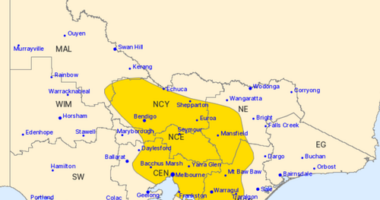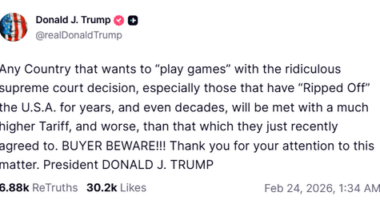Share this @internewscast.com
Key Points
- The UK and France have criticized Israel’s recent military actions in Gaza.
- The UK’s foreign minister has summoned the Israeli ambassador to discuss the UK’s demands regarding Gaza.
- Australia has joined a statement urging Israel to allow humanitarian aid into Gaza.
“Disturbing UN accounts on the worsening plight of children in Gaza emphasize our demands. The Israeli Government must not permit the suffering to endure.”
Analysts point out these actions are “noteworthy” but are unlikely to quickly influence Israel, as its primary military and financial backing comes from the United States.

An aid truck bound for the Gaza Strip is seen heading towards the Kerem Shalom border crossing in southern Israel. Source: AAP / Maya Alleruzzo
Jessica Genauer, a senior lecturer in international relations at Flinders University, said Israel’s latest ground incursion was a major factor driving international partners to put pressure on Israel.
“We haven’t seen such coordinated action around the possibility of actually imposing economic costs on Israel until such time as they shift approach in order to actually alleviate the humanitarian crisis in Gaza, so I think for that reason it is very significant,” she told SBS News.
What have Israel’s partners said about Gaza?
UK Prime Minister Keir Starmer told parliament he was “horrified” by Israel’s military escalation in Gaza, repeating calls for a ceasefire.
He said the Israeli ambassador to the UK was being summoned to hear British demands that the latest assault on Gaza be halted.

Britain’s Foreign Secretary David Lammy announced the UK government had suspended negotiations with the Israeli government on a new free trade agreement in response to violence against Palestinians in the West Bank and called for an end to the aid blockade in Gaza. Source: EPA / House of Commons handout / EPA
Senior lecturer in peace and conflict studies at the University of Sydney, Eyal Mayroz, told SBS News that other international voices carried less weight than that of the US.
When announcing the resumption of “minimal” Gaza aid deliveries on Monday, Israeli Prime Minister Benjamin Netanyahu said the country’s “closest friends in the world,” including US politicians, told him they were unwavering in their support but could not “handle pictures of mass starvation”.
What has Israel’s response been?
“External pressure will not divert Israel from its path in defending its existence and security against enemies who seek its destruction.”

Seven-year-old Ahmed Abdelaal, who shows signs of malnutrition, in his family tent at a camp for displaced Palestinians in Mawasi Khan Younis, Gaza Strip. Source: AP / Abdel Kareem Hana / AP
Netanyahu also says Israel has no intention of stopping until its goal of defeating Hamas is achieved.
“This is part of defeating Hamas … This is the war and victory plan.”
Has Australia’s position shifted?
“At the very least, the prime minister could join the statement of our allies,” Faruqi said in a post on Instagram.

Smoke rises as a result of Israeli military shelling on the town of Beit Hanoun in the northern Gaza Strip, as seen from the Israeli-Gaza border in southern Israel. Source: EPA / Atef Safadi
“Calling on Israel to allow aid through, without backing it with real action, is meaningless,” Faruqi said.
“But if a lot of our partners around the world … actually pursued these avenues vis-a-vis Israel, then I think that Australia will at some stage follow suit, but that would be more in the medium term, not the immediate term.”










